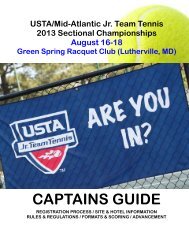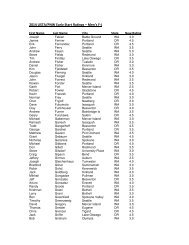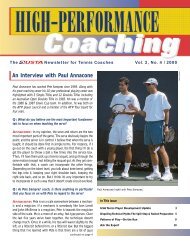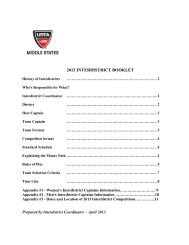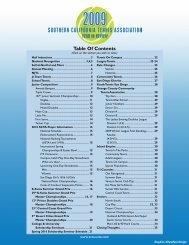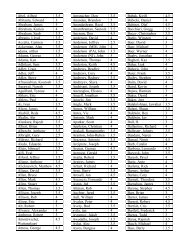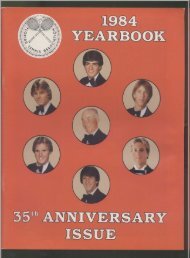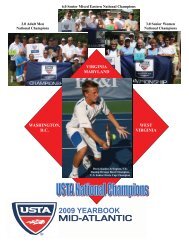FRIEND AT COURT 2010 - USTA.com
FRIEND AT COURT 2010 - USTA.com
FRIEND AT COURT 2010 - USTA.com
You also want an ePaper? Increase the reach of your titles
YUMPU automatically turns print PDFs into web optimized ePapers that Google loves.
9. Penalties to be imposed on a doubles team. A penalty on a member of a<br />
doubles team is considered to have been imposed on the team.<br />
10. Penalties treated as if points actually played. All penalties under the Point<br />
Penalty System are treated as though the penalty points or penalty games<br />
actually had been played so far as serving order, court occupancy, and ball<br />
change are concerned. One exception, as Table 14 indicates, is that a<br />
player penalized for lateness also shall be deemed to have lost the toss<br />
provided for in Rule 9 of the ITF Rules of Tennis. The penalized player is<br />
allowed to choose an option, but only after the opponent has chosen. A<br />
second exception is that the first ball change shall be calculated from the<br />
first game played. The choice to serve or receive shall apply to the first<br />
game played.<br />
11. Time delays when each side is responsible. If both players or teams are<br />
equally responsible for delay during a match, any penalty will be imposed<br />
upon the server.<br />
12. Penalties after medical condition develops. Except during the warm-up,<br />
a player suffering from a medical condition may buy time with a penalty.<br />
13. Penalties imposed between games or before match. A penalty imposed<br />
between games or before the start of a match shall apply to the first point<br />
of the next game scheduled to be played.<br />
14. Point penalties. A point penalty is scored as though the player had played<br />
and lost what would have been the next point.<br />
15. Player may not decline penalty. A player who is the beneficiary of a penalty<br />
imposed upon the opponent may not decline to accept it. A player who<br />
disobeys the instructions of an official in such a case is liable to being<br />
defaulted.<br />
16. Reporting penalties to Referee. When feasible, a Roving Umpire should<br />
promptly notify the Referee that a code violation has been assessed. After<br />
a match, officials shall report to the Referee each code violation imposed.<br />
17. Other disciplinary action. Nothing in the Point Penalty System rules out a<br />
subsequent imposition of monetary fines, suspensions, or other disciplinary<br />
actions by whatever governing body has jurisdiction.<br />
18. Announcing score after penalty. After a point or game penalty, the new<br />
score should be announced. After assessing a penalty that ends the match,<br />
the official should delay announcing the score until the official determines<br />
whether the penalized player will appeal.<br />
19. Lateness. Lateness for a match, lateness for resumption of a suspended<br />
match, and lateness after a rest period shall be penalized pursuant to Table 14.<br />
20. Default for failure to arrive on time.<br />
a. Discretion of Referee. The Referee is responsible for issuing defaults<br />
for failure to arrive on time. After considering all relevant<br />
circumstances, the Referee may elect not to default a player or to<br />
reverse a default for failure to arrive within 15 minutes of the time<br />
when the match was scheduled and called.<br />
b. Appeal of default. If the Referee defaults a player for failure to arrive<br />
within 15 minutes of the time when the match was scheduled and<br />
called, the player may appeal the default to the Tournament<br />
Appeals Committee. The Committee may reverse the default after<br />
consideration of all relevant circumstances. If the Committee<br />
122 <strong>USTA</strong> REGUL<strong>AT</strong>IONS IV.D. (Point Penalty System)



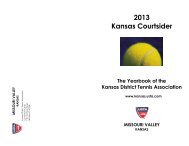

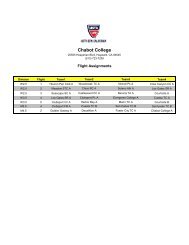

![COMPLETE - 2013 Tournament Schedule [11_20_12] - USTA.com](https://img.yumpu.com/21906454/1/190x245/complete-2013-tournament-schedule-11-20-12-ustacom.jpg?quality=85)

